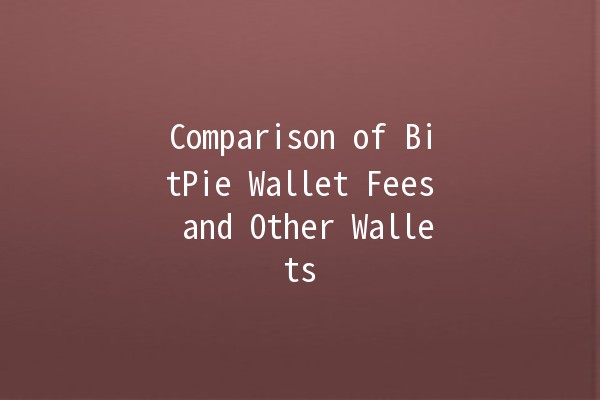




In the evolving landscape of cryptocurrencies, wallets have become essential tools for safely managing digital assets. Choosing the right wallet can be daunting, especially when it comes to understanding the fees associated with different options. In this article, we focus on BitPie Wallet, one of the prominent wallet solutions, and compare its fees with other popular wallets in the market. We will provide practical tips on how to maximize productivity and save costs when managing your cryptocurrencies.
Wallet fees are charges incurred while using cryptocurrency wallets. These can include transaction fees, withdrawal fees, and other associated costs. The fees differ from one wallet to another based on various factors, including the wallet's features, security measures, and the cryptocurrency being transacted.

BitPie Wallet is particularly known for its userfriendly interface and robust security features. Below is an overview of its fees:
Transaction Fees: BitPie utilizes a tiered fee structure based on the transaction amount and network demand, similar to many wallets. Users can expect fees typically ranging from 0.1% to 1% per transaction.
Withdrawal Fees: BitPie does not charge a withdrawal fee for most cryptocurrencies; however, users may incur network fees based on the cryptocurrency being withdrawn.
Deposit Fees: No deposit fees are charged when adding funds to the BitPie Wallet.
Maintenance Fees: There are no maintenance fees associated with using the BitPie Wallet.
Conversion Fees: The conversion fees are around 0.2% for cryptocurrency swapping.
Transaction Fees: Fees vary depending on the transaction method but can be as high as 1.5%.
Withdrawal Fees: Coinbase charges approximately $0.15 for bank transfers but varies based on the method of withdrawal.
Deposit Fees: No fees when depositing funds using a bank transfer.
Maintenance Fees: No ongoing maintenance fees.
Conversion Fees: Up to 2% for currency conversion.
Transaction Fees: Users pay network fees; no additional charges from the wallet itself.
Withdrawal Fees: No withdrawal fees, but users must pay network fees when sending funds.
Deposit Fees: No deposit fees, as it's a hardware wallet.
Maintenance Fees: None whatsoever.
Conversion Fees: No conversion fees through Ledger but can incur fees from thirdparty exchanges.
Transaction Fees: Users pay the network fees; no additional costs from the wallet.
Withdrawal Fees: No withdrawal fees; users only pay the network fees related to their transactions.
Deposit Fees: No deposit fees for adding cryptocurrencies.
Maintenance Fees: There are no maintenance fees.
Conversion Fees: Conversion fees can vary depending on the exchange rates but typically range from 0.5% to 3%.
Transaction fees can vary significantly during peak network hours. Monitoring network conditions can help you save on fees by allowing you to execute transactions at optimal times. For instance, executing trades late at night or during weekends may incur lower fees.
If you have multiple transactions, try to combine them into one to minimize transaction fees. Most wallets allow users to send funds to multiple addresses in a single transaction, significantly reducing costs.
Many wallets, including BitPie, offer various features such as builtin exchanges or staking opportunities. Familiarizing yourself with these features can help you effectively manage your funds without incurring excessive costs.
While fees are essential, also consider the security and usability of wallets. A wallet with slightly higher fees but better security features may save you money in the long run by reducing the risk of hacks or theft.
Some wallets allow you to adjust transaction settings for faster or cheaper confirmation times. Regularly check these adjustments to fit the current network conditions, allowing you to optimize fees based on your transaction urgency.
Yes, BitPie Wallet employs advanced security protocols, including multisignature authentication and strong encryption. Users are encouraged to enable twofactor authentication for additional security layers.
No, BitPie Wallet is transparent about its fees. Users only incur the fees mentioned above, which include transaction and conversion fees, with no hidden charges.
BitPie does not charge withdrawal fees, but you may incur standard network fees associated with the specific cryptocurrency you're transferring.
BitPie Wallet generally offers competitive fees, particularly in withdrawal transactions where most competitors impose fees. The absence of maintenance fees is also an advantage.
BitPie Wallet supports a broad array of cryptocurrencies, including Bitcoin (BTC), Ethereum (ETH), Litecoin (LTC), and many ERC20 tokens. Always check the latest supported asset list for updates.
Yes, BitPie Wallet offers staking and earning opportunities for certain supported cryptocurrencies, allowing users to generate passive income while holding their assets.
Choosing the right cryptocurrency wallet involves understanding not just the features and security but also the fees associated with each option. BitPie Wallet stands out for its competitive fee structure and userfriendly interface, making it an excellent choice for both beginners and experienced users. By implementing the tips outlined above, you can effectively manage your cryptocurrencies while minimizing costs. As always, be sure to stay informed about changes in fees and wallet features to optimize your cryptocurrency management experience.